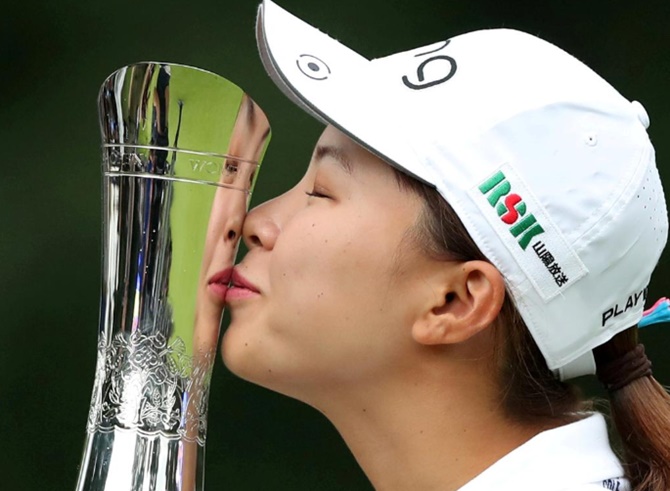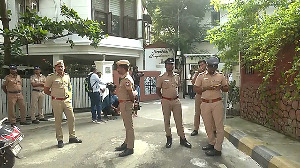
With the Tokyo Olympics less than a year away, speculation is growing in Japan over who will be the final torchbearer to light the cauldron in the new Olympic Stadium, in the traditional ritual that begins every Games.
Some predict a famous Japanese athlete, such as retired baseball player Ichiro Suzuki, will do the honours. Others say it will be an ordinary, but symbolically important, person.
Picked to light the flame in 1964, the last time Tokyo hosted the Games, was Yoshinori Sakai, a 19-year-old college athlete born in Hiroshima on Aug. 6, 1945, the day of the U.S. atomic bombing - a choice meant to highlight Japan’s remarkable post-war reconstruction.
This time, Prime Minister Shinzo Abe wants the Games to showcase Japan’s recovery from the 2011 earthquake, tsunami and Fukushima nuclear crisis, fuelling speculation that the choice could be a young person or emerging athlete from the devastated northeast.
Olympic organisers say they will not reveal the final torchbearer’s identity until the torch arrives in the stadium on live television, watched by billions of spectators.
Three-time gold medal-winning wrestler Saori Yoshida is one possibility often mentioned in domestic media. A household name in Japan, she won 13 straight World Wrestling Championship titles, surpassing Russian great Aleksandr Karelin’s nine.
Another oft-named candidate is rising international baseball star Shohei Ohtani. The winner of last year’s American League Rookie of the Year award is sometimes compared to the legendary Babe Ruth, because he can both pitch and hit at an elite level.
Picking a baseball player might be a nod to the one-off reappearance of the sport at this Olympics after it was removed in 2012 and 2016.
Yuzuru Hanyu, a hearthrob for the Japanese, who became the first man in more than 50 years to win back-to-back figure skating gold medals, also figures in the discussion. He hails from Sendai, a northern city hit by the 2011 tsunami.
Other former Olympic champions in the running include three-time judo champ Tadahiro Nomura and breaststroke king Kosuke Kitajima. The Asahi Shimbun newspaper has also mentioned Naoko Takahashi, a gold medallist in women’s marathon, besides Yoshida, Nomura and Kitajima.
In an effort to show Japan is becoming a more diverse society, organisers could choose rising tennis star Naomi Osaka, whose father is Haitian and mother Japanese.
Or, in a nod to the future, they could pick 20-year-old golfer Hinako Shibuno, who won the Women’s British Open this month in her first LPGA event, the first Japanese woman to win a major in 42 years.
“This time, it’s got to be Shohei Ohtani or Naomi Osaka or Hinako Shibuno,” said 80-year-old Toshihiro Ishikawa, who watched the opening ceremony at the 1964 Games from a seat in the now-defunct original national stadium.
“They have a great future ahead of them. If such a person climbs the stairs and lights the cauldron, it will brighten the entire nation.”
To emphasise Japan’s recovery from the 2011 disaster, after the Olympic flame is lit in Greece, it will be flown to Matsushima air base, which was hit by the tsunami.
Then the four-month torch relay will begin on March 26 at J-Village, a soccer training centre in Fukushima that served as a frontline operations base for workers who battled the crisis at the nuclear power plant after meltdowns at three reactors.
About 10,000 people will participate in the torch relay across Japan in the lead-up to the July 24-Aug. 9 Olympics. Each is set to run about 200 metres (220 yards).
The 2020 organisers say they will not reveal how the final torchbearer will be chosen.
Paralympics chief wants Tokyo 2020 to help change perceptions
Andrew Parsons, president of the International Paralympic Committee (IPC), hopes Tokyo 2020 will spark a change in perceptions of people with disabilities in Japan.
Sunday marks a year to go until the start of the Tokyo 2020 Paralympics, which run from Aug. 25 to Sept. 6, and Parsons, who took over as IPC president in 2017, is confident the Games will have a lasting impact beyond the 13 days of sporting action.
Parsons told Reuters in a telephone interview that he thought both Tokyo Governor Yuriko Koike and Japanese Prime Minister Shinzo Abe were on the same page when it came to the legacy of the Paralympics.
“I believe that Governor Yuriko Koike and Prime Minister Abe are serious when they talk about legacy,” said Parsons.
“The first thing is that they accept, and this is really important, they accept that they need to improve even in an advanced society.”
For Parsons, this means changing Japanese society’s perceptions of what people with disabilities are capable of. The Brazilian said he wanted the Paralympics to shine as an example of what they can achieve.
“We have been visiting Japan since 2013 very often and what we realise is the perception of Japanese people to those with disabilities is one of over-protection,” said Parsons.
“You don’t see many people with disabilities on the streets of Tokyo.
“To show to Japan the feats of our athletes, who can do things that was previously thought impossible, will change key things in the mind of Japanese society that people with disabilities can do everything.
“They can be productive citizens, they can work, they can study and can go out there and do anything anybody else can do.”
The ticket pricing structure has been created with a view to attracting as many young people to attend Paralympic events as possible, which includes seats as cheap as 900 JYP (US$8.55).
“This is why we want to encourage youth to come to venues and see Paralympic athletes, said Parsons.
“Then the change is there when they are adults and making decisions, not only on a political level but also at a business and service level, where people will have a different perceptions of people with disabilities.”
Governor Koike has said she wanted one of the legacies of the Paralympics to be that “anyone can easily and comfortably visit the city” but one remaining concern in the run-up is making sure there are enough wheelchair-accessible hotel rooms in Tokyo during and after the Games.
An estimated 4,400 Para athletes, including 1,800 in wheelchairs, are expected to arrive in Tokyo for the event.
While those athletes will be housed in the wheelchair-friendly village, the Tokyo metropolitan government says 850 accessible hotel rooms will be needed for support staff, media and other stakeholders.
It is currently 300 rooms short of that number.
“Accessible accommodation in hotels is something that is a low point for the country and they need to address that,” added Parsons.
“We are addressing it together and the legislation is being changed.”
Japanese laws require hotels with 50 or more rooms to have at least one wheelchair-accessible option available. Legislation coming into effect after the Games will stipulate that at least one percent of all rooms in a hotel are wheelchair-friendly.
“This will not affect the Games, this is for the future, for legacy, but it is the first tangible legacy of the Games that the legislation is changing in Japan,” added Parsons.












